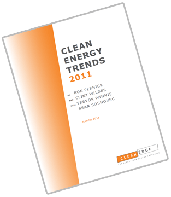Five States Top U.S. in Clean-Energy Leadership
 U.S. Clean Energy Leadership
U.S. Clean Energy LeadershipIndexProvides Companies, Investors, and
Governments with Critical Data and Insights on the Clean-Energy
Landscape
Clean Edge’s second annual
href=”http://click.icptrack.com/icp/relay.php?r=83723393&msgid=706974&act=9IKX&c=538410&destination=http%3A%2F%2Fcleanedge.com%2Fleadership%2F”>
U.S. Clean Energy Leadership Index,
released today, provides the industry’s most comprehensive and
objective analysis and ranking of how all 50 states, and the
individuals, businesses, and organizations that operate there,
compare across the clean-energy spectrum.
According to Clean Edge’s assessment and ranking of more
than 70 different indicators in technology, policy, and capital,
the top 10 states in the nation are California, Oregon,
Massachusetts, New York, Colorado, Washington, New Mexico,
Minnesota, Connecticut, and Vermont.
Key market indicators tracked
by Clean Edge include total electricity produced by clean-energy
sources, hybrid and electric vehicles on the road, clean-energy
venture and patent activity, and policy regulations and
incentives.
The 2011 Leadership Index
paints an important and insightful picture of the U.S. clean-energy
landscape. Based on this analysis the bottom 10 states in this
year’s rankings (placing 41st through 50th) are Oklahoma, Wyoming,
Alaska, North Dakota, Louisiana, Nebraska, Arkansas, Alabama,
Mississippi, and West Virginia. href=”http://click.icptrack.com/icp/relay.php?r=83723393&msgid=706974&act=9IKX&c=538410&destination=http%3A%2F%2Fcleanedge.com%2Fleadership%2F”>
title=”Click for More Detail”>

Highlights from this year’s
research include:
style=”margin: 0in 0in 0pt; color: #333333; vertical-align: top; mso-margin-top-alt: auto; mso-margin-bottom-alt: auto; mso-list: l0 level1 lfo1; tab-stops: list .5in;”>
Three states now generate more than 10 percent of their
utility-scale electricity from wind, solar, and/or geothermal. Iowa
leads the nation with 15.4 percent of its electricity now generated
from wind power, followed by North Dakota (11.99 percent from wind)
and California (10.06 percent from wind, solar, and
geothermal).
style=”margin: 0in 0in 0pt; color: #333333; vertical-align: top; mso-margin-top-alt: auto; mso-margin-bottom-alt: auto; mso-list: l0 level1 lfo1; tab-stops: list .5in;”>
Top-ranked California’s longtime commitment to clean energy
has put the state far ahead of the pack in terms of technology
deployment and capital creation. The state’s burgeoning
clean-energy industry brings in more venture capital than all other
states combined.
style=”margin: 0in 0in 0pt; color: #333333; vertical-align: top; mso-margin-top-alt: auto; mso-margin-bottom-alt: auto; mso-list: l0 level1 lfo1; tab-stops: list .5in;”>
Idaho leads the U.S. in clean electricity as a percentage of
its total generation - at an astounding 84 percent - when you
include hydro and biomass. Other states that get more than 60
percent of their electricity from renewable sources including hydro
and biomass are Washington (71.59 percent), South Dakota (65
percent), and Oregon (63.84 percent).
style=”margin: 0in 0in 0pt; color: #333333; vertical-align: top; mso-margin-top-alt: auto; mso-margin-bottom-alt: auto; mso-list: l0 level1 lfo1; tab-stops: list .5in;”>
Oklahoma had more new EVs registered last year than any other
state, but the number is somewhat misleading. Two of the nation’s
largest rental car agencies register their vehicles in Oklahoma,
accounting for the state’s high ranking for EV registrations in
2010. Without that statistical anomaly, California is the nation’s
EV leader.
style=”margin: 0in 0in 0pt; color: #333333; vertical-align: top; mso-margin-top-alt: auto; mso-margin-bottom-alt: auto; mso-list: l0 level1 lfo1; tab-stops: list .5in;”>
Michigan held the top spot in clean-energy patents for 2010
with 192 patents. Leading the charge is General Motors, which is
reinventing itself as a sustainable transportation leader. GM
received more clean-energy patents last year than any other company
in the U.S., with 135 patents registered in 2010.
style=”margin: 0in 0in 0pt; color: #333333; vertical-align: top; mso-margin-top-alt: auto; mso-margin-bottom-alt: auto; mso-list: l0 level1 lfo1; tab-stops: list .5in;”>
Mississippi, which ranks in the bottom 10 of the overall
Leadership Index, is aggressively pursuing clean-tech manufacturing
as it aims to garner its share of the clean-tech market. In the
past year, the state has attracted a host of clean-tech companies
to build manufacturing facilities and plants there, including
California-based solar company Stion Solar Panels and Texas-based
biofuel company KiOR. This shows that even low-ranking states are
beginning to aggressively target clean-tech companies and services
for their job creation and capital attraction, and are likely to
rise in the ranks.
“This year’s Leadership index shows that
clean-energy activity is dispersed across the nation, with leaders
on both coasts and in between,” says Clean Edge managing director
Ron Pernick. “While the industry faces many challenges, including
strong national-level commitments in China and Germany against the
backdrop of uncertain federal leadership here, the U.S. is still a
relevant clean-energy innovator as exhibited by the state-level
movements tracked in this year’s Leadership index.”
About
the U.S. Clean Energy Leadership
Index
Clean Edge’s U.S. Clean Energy Leadership
Index tracks and analyzes the clean-energy economies of
all 50 states. The detailed information (data from more than 70
indicators) covers technology, policy, and capital infrastructures
for the clean-energy ecosystem. The subscription product is geared
toward corporations, economic development agencies, investors,
policy makers, technology innovators, foundations, and other
stakeholders actively involved in the clean-tech
marketplace.
You can return to the main Market News page, or press the Back button on your browser.

